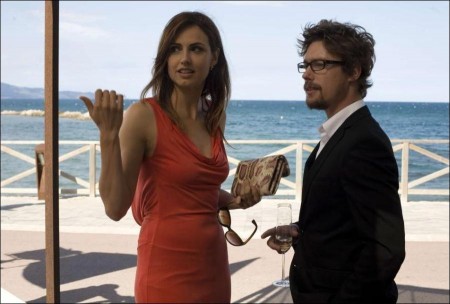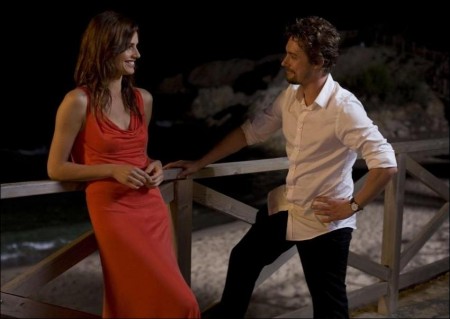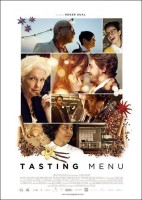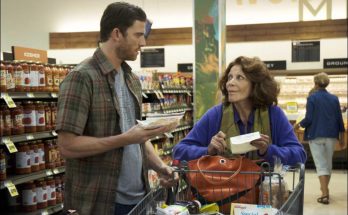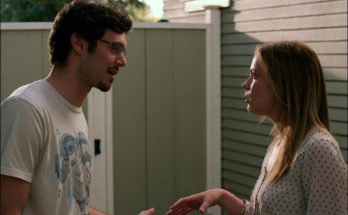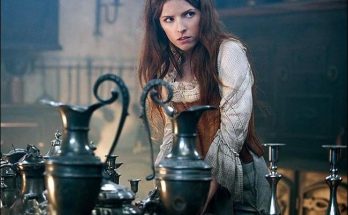One of the greatest restaurants in the world is closing and an eclectic mix of international patrons have arrived in beautiful Catalonia for the final dinner service in this witty and delicious ensemble comedy. As the staff prepare and serve an audacious tasting menu, a young couple in the midst of a divorce who made their reservation a year ago (before separating) reunite for this once-in-a-lifetime meal. Can their romance be rekindled with the help of the widowed countess dining with her husband’s ashes? Will the brilliant chef be able to pull off a perfect finale?
An Irish and Spanish co-production, TASTING MENU, like all great ensemble dramedies centered on culinary delights, is a crowd-pleasing mishmash of relationships, feuds, and broken dreams that are mended through the simple act of “breaking bread” and the universal appreciation of great food. Similar in style to foodie classics like Babette’s Feast, Big Night and Chocolat, TASTING MENU will leave you awash in a European sensation of joie de vivre.
Director’s Statement
Eastern societies have always related the act of eating with nourishing the human body and soul at the same time. It’s one of the few universal pleasures, and the only one we can enjoy using the five senses: taste, sight, smell, touch and hearing. As the Brazilian writer Luis Fernando Verissimo once said: “It’s not every day you want to listen to a Bach sonata, or love a woman – but every day you want to eat. Hunger is the only omnipresent need you keep up with. Sight has an end, hearing too, sex finishes, power too. But hunger will always be there.”
Ferran Adrià in his book “A Day at elBulli” said: “Our tasting menu is like a movie with its different scenes.” We are going to make these scenes become a unique Tasting Menu and a film to be enjoyed with your five senses.
The intention of avant-garde cooking has always been to provoke, to entertain, to make people happy. But above all these things, it’s been to leave those who’ve tried it speechless. And we are in one of its best moments in history, at least in Spain. We are at the forefront of a unique culinary movement that’s showing that with honest and hard work, compensation comes in the end. Right now Spanish cuisine means quality, innovation and creativity. That’s why when I started thinking of making a film that would take place in the best restaurant in the world. I knew it had to be shot in Spain, in Catalunya, in Barcelona.
The idea of having the audience feel like they’ve eaten a 30 dish tasting menu while they are witnessing the stories of the characters who are actually trying the best food they’ve ever eaten was very tempting. How do they feel? What’s going on in their heads? What has actually changed them? If I manage to get those feelings to come through on screen, it will be as if the audience had actually been there that night. And the feelings that this film produces, like empathy, love or friendship, will be theirs forever. It’s the same effect created with the scene in Ratatouille where the food critic experiences a “déjà vu” the moment he eats the food cooked by a rat, and it literally transports him to his childhood when his mom cooked ratatouille in the French countryside.
That’s why one of the most important things in this film is trying to make the audience feel something they’ve never felt before. It’s like being in an amusement park when you were little, or like reading a good novel and finding out that in the end there is a twist that surprises the audience. Like avant-garde cuisine, this film is not trying to “please” all audiences. The most important result is the emotion the images create in the audience. It could be happiness, sadness, or a mix of the two. But in the end this film has a feel good ending that will make the audience think, and go home asking themselves some questions, including: “Am I living the life I really want to live?”
Also crucial for the film are the subjectivity and community issues. Subjectivity because, who’s the one to say this is the best dinner in the world? It takes two to tango, and in this case, if the one who’s eating the wonderful dinner is not the perfect guest, you have the first point of contradiction. As in any art, what one person may feel as “supreme”, may not be considered so by another. That’s an important issue I try to explore in the film: cooking, as an art is subjective. That’s also true in love: you can be doing something you consider “wonderful” for your partner, but then again, your partner might not experience as wonderful. This is something really interesting to see in a dramedy, because it creates odd situations when there are misunderstandings.
On the other hand, perception is also a very unique and solitary exercise. We also want to explore the possibility of creating a community. Eating can only be experienced by one and that reflects the main problem in a restaurant: you can’t turn to another table to discuss the taste of a dish. This is a challenge we wanted to address in our film: the creation of a community. People who are so different, from so many countries and backgrounds having to find ways to participate in a common effort for the good of all. Our characters have to leave their problems and opinions behind and share a moment where everyone counts, everyone is important, and it can’t be done without the contributions of all of them.
All of the characters gather on the last evening that Chakula will be open and although they arrive alone they get together from a very specific starting point: their individual personal crises. The dinner is the catalyst that changes everything. By the end of the night, they will have learned how to work together in order to achieve a good for the community. This is a very important issue in the film because it says a lot about mankind nowadays; how different we are from each other, and how often we focus on the things that separate us and not the things that bring us together.
I want to emphasize the fact that all of the characters are isolated in their individualism; they each have their own personal crisis and they seem not able to find a way to mend this. They focus on their own problems from their own perspective but when events need them to join together, they go from sounding like 40 different instruments to sounding like a real orchestra. The cuisine that’s showed in the film has the effect of making the diners participate in the process, in the magic, in the game. The events during the night force the diners to come together, to participate, to sound like a harmonic orchestra. They leave their fears, worries and individualism behind, and work towards the common happiness, making the dinner a unique experience. They are the witnesses of the last night of the Best Restaurant in the World, so they have to keep up with the expectations.
These are times when we need to focus on how necessary it is to leave our differences behind. TASTING MENU explores this from a comedic point of view. Our community is in need of a common vision where we can all help, be helpful and be appreciated for our own differences. – Roger Gual
About the Costa Brava
The Costa Brava (“Wild Coast”) is a unique coastal region in northeastern Spain. It is known for its gorgeous coastline, breath-taking vistas, world-class gastronomy, and a wealth of culture.
The Costa Brava has hosted and inspired artists such as Salvador Dalí, Truman Capote, Federico Garcia Lorca and Pablo Picasso. As of 2012, 11 restaurants with 15 Michelin stars and five restaurants with six stars can be found along the Costa Brava. Among them are El Celler de Can Roca, the current Best Restaurant in the World, the Miramar Restaurant in Llança and Les Cols de Olot. They follow the legacy of the legendary Spanish restaurant elBulli.
Avant-Garde Cuisine in Tasting Menu
Eating is a unique experience. It is one of the most universal pleasures in life, besides being the only one that can be enjoyed with all five senses.
The avant-garde cuisine in Spain is currently at its pinnacle. Today, Catalan and Spanish cuisine are synonymous with quality, innovation and creativity.
The intention in TASTING MENU is for viewers to come away with the feeling of having eaten a 40 dish tasting menu as the diners explain the stories that have happened over the four hours of sitting at a table, eating the most amazing dishes they have ever tasted. How have they felt, what happened to them, what has changed in them?
In the end, we hope the film leaves you with a good taste and a memorable feeling that goes beyond the movie.
Moreover, the film presents a clear theme: all the characters are experiencing an individual crisis that eventually will forge a collective catharsis. The performance of the dinner itself takes our characters into situations in which they must lose their individuality, the layers that we all acquire as we become adults, in order to become children again and enjoy life – because happiness can be achieved if we stick together.
The Stars of Tasting Menu on Food
“Food is another character in the story. It gives a touch of originality to the film because the food is so beautifully presented. Of course, Catalonia’s gastronomy is exquisite and this is very well reflected in the movie” – Fionnulla Flanagan, “The Countess”
“My working method was to visit the kitchens of chefs who have Michelin stars. I went to multiple restaurants. First I was with Carme Ruscalleda at Can Pau. It was wonderful. I spent the whole day seeing how they worked from within, from early morning until they approached a table and spoke to diners. Then I went to El Celler de Can Roca. I was basically Joan’s handoff. He let me be with him all day, watching, talking to everyone, recording, working… It was a deep dive into avant-garde cuisine and now I can try and cook for friends” – Vicenta N’Dongo, “Chef Mar Vidal”
“It was a pleasure to participate in a culinary film because I’m a foodie; I was so excited since I’m a huge fan of such films as Tampopo, Babette’s Feast and La Grande Bouffe”. – Andrew Tarbet, “Max”
Tasting Menu
Directed by: Roger Gual
Starring: Jan Cornet, Claudia Bassols, Vicenta N’Dongo, Andrew Tarbet, Fionnula Flanagan, Stephen Rea
Screenplay by: Javier Calvo, Silvia González Laá
Cinematography by: Emilio Guirao
Film Editing by: Alberto de Toro
Costume Design by: Coro Mateo
Art Direction by: Maite Sánchez
Music by: Stephen McKeon
MPAA Rating: PG-13 for brief strong language.
Studio: Magnolia Pictures
Release Date: April 18, 2014
Visits: 74
